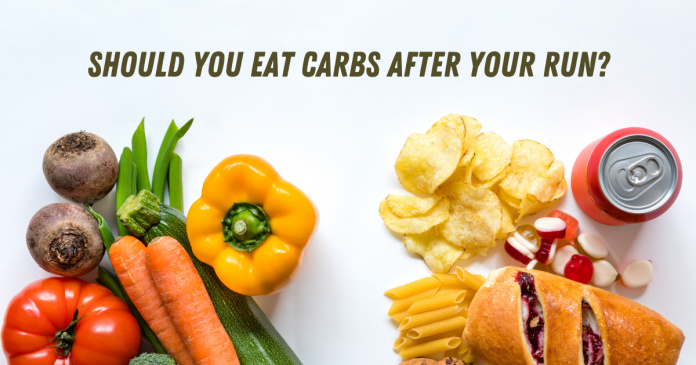Runners often wonder if they should eat carbs after their runs at night. On one hand, carbohydrates help you recover from your workouts so you can continue hitting your fitness goals. On the other hand, consuming food after a run at night may disrupt your sleep, which hinders recovery time. Moreover, sugar is a carbohydrate, which can keep you from feeling sleepy despite going for a run at night.
In order to answer the question of what to eat after a run at night, keep reading to learn how your body processes carbohydrates, fats, and proteins.
Carbs provide your body with energy, and it utilizes them effectively. Fat, however, always requires sufficient oxygen to burn. Fat also takes twice as long to provide the same amount of energy as carbohydrates. This is why we have to run at a slower pace to burn fat, so that our body can keep up with the oxidation process without getting exhausted. Whenever your breathing slows down, you’re in the fat-burning zone. Fast and shallow breathing means your body is not burning fat as efficiently as it could.
Your body stores carbs in the form of glycogen in your liver and muscles. Glycogen is an important energy source, especially for runners. The more glycogen your muscles have stored, the better and longer they can perform.
NUTRIENT RATIOS FOR ENDURANCE ATHLETES ARE AS FOLLOWS:
- Carbohydrates: 55-65%
- Protein: 10-15%
- Fat: 25-30%
THE IMPORTANCE OF CARBS AFTER A RUN
Carbohydrates fuel your muscles. Runners looking to enhance their performance (e.g., for a marathon) should consider taking this macronutrient before and after workouts. You will recover quicker if you replenish your glycogen stores immediately after a run. As a result, your body will adapt more quickly to a new workout or harder workout, and your immune system will recover faster after your workout. For your recovery, a diet high in carbohydrates becomes increasingly important the more you train or the more intensely you train.

WHEN AND HOW MANY CARBS TO EAT AFTER A RUN
After your workout, the best time for your body to replenish glycogen stores is within the first 30 minutes. Consume about 0.5 grams of carbohydrates per kilogram of body weight. Approximately 30 g of carbohydrates are needed for a 65 kg woman.
30 g of carbohydrates can be in the form of:
- one medium banana
- 5 dates
- 1 slice of bread with jam
- 40 g of granola with 200 ml of cow’s milk
These carbohydrates (simple carbs) digest easily and are quickly absorbed by the body. The absorption window slowly closes after 30 minutes, and your body is no longer able to absorb carbs as efficiently and quickly.
WHAT TO EAT AFTER A RUN AT NIGHT
You should eat a full meal with carbs, protein, and fat one hour after your run. You should consume a meal that contains a 3:1 carbohydrate to protein ratio. At this point, carbs are still important, but your body also needs protein to build muscles. However, too much of this macronutrient can interfere with the efficient absorption of carbohydrates and disturb your body’s fluid balance.
WHAT TO EAT AFTER A NIGHT RUN TO LOSE WEIGHT
Runners who wish to lose weight should avoid eating too many carbs, particularly simple carbohydrates. A balanced diet must contain complex carbohydrates, as we’ll see below. Short endurance runs (like a 5K run) do not deplete our glycogen stores, so you don’t need to replenish them at the end of the run (for example, with isotonic sports drinks). Drinking water after a short run is the best choice.
One to two hours after your run, eat a mix of complex carbohydrates and protein. If you want to lose weight, what matters is a negative energy balance (around 500 calories per day). In other words, you should burn more calories than you consume.
EAT COMPLEX CARBS AFTER A RUN AT NIGHT
A runner looking to lose weight needs to pay attention to what they eat as well as their training. Complex carbohydrates are the best thing to eat (along with high quality protein and healthy fats). The minerals and vitamins in these fruits and vegetables will not only keep you full, but will also support your metabolism and immune system. Complex carbohydrates can be found, for example, in whole-grain products (such as pasta and bread). Whole grains include all the original parts (bran, germ, and endosperm) as well as their nutrients. Simple carbohydrates are obtained by removing the outside and only keeping the endosperm. Other foods containing complex carbohydrates are potatoes with the skin on them, legumes, and vegetables.
WHAT ARE THE DIFFERENT TYPES OF CARBOHYDRATES?
COMPLEX CARBS TO REFUEL AFTER A RUN AT NIGHT
Carbohydrates that are complex take longer to digest and contain a lot of vitamins, minerals, trace elements, and fiber, which boosts your metabolism and strengthens your immune system:
- Whole grains and products incl. pasta, bread, and rolls
- Potatoes with the skin on them
- Brown rice
- Beans, lentils and peas
- Vegetables, 100% vegetable juice
- Fruit
AVOID SIMPLE CARBS AFTER A RUN AT NIGHT
Carbs are a quick source of energy because they are digested rapidly. They cause your blood sugar and your insulin levels to rise:
- pastry flour and products, cakes, cookies, bread, and rolls
- white pasta
- soft drinks
- sugar and sweets
- alcohol
In conclusion, eat carbs after night runs to prioritize recovery. Minimize eating carbs after runs at night if that is part of your weight loss strategy.


